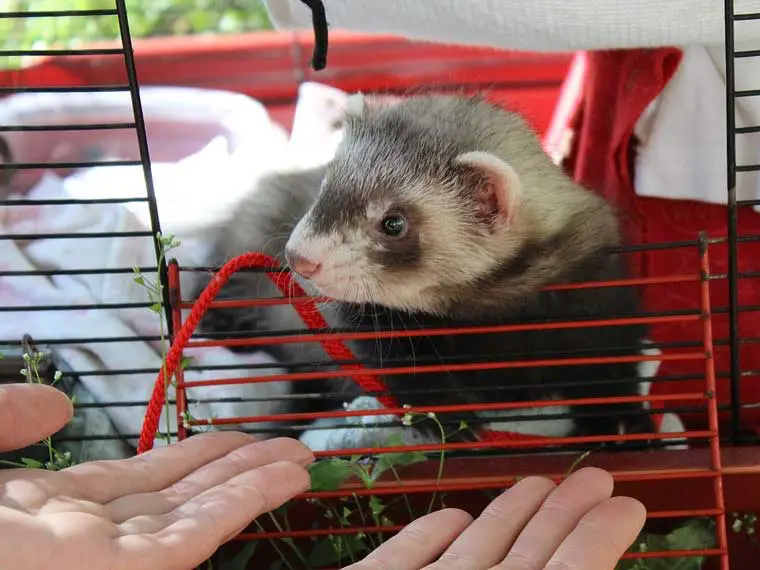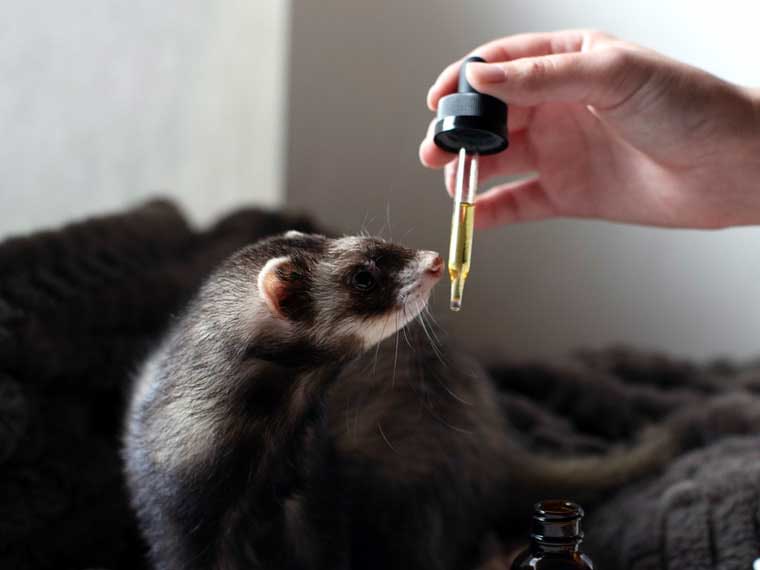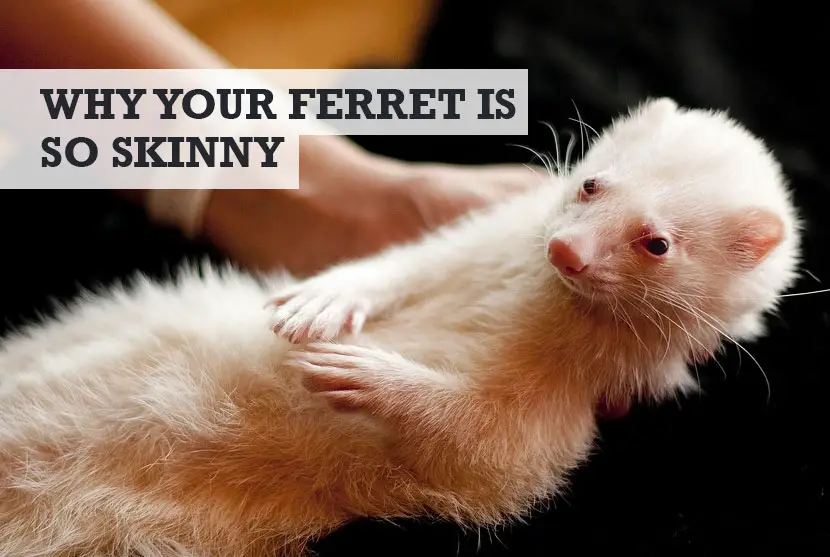First-time ferret ownership comes with many challenges, some of which manifest themselves as worry, particular when it comes to your ferret’s weight. Ferrets can be naturally skinny animals, but there can come a point when your ferret is too skinny.
If you think your ferret is so skinny, he or she could be underweight, please read the following guide. If you are at all worried, you should always consult with a vet.
Why is my ferret getting skinny?
Your ferret could be getting skinny for reasons including health, time of year, an incorrect diet, neutering, stress, or ageing. All of these factors are discussed further down the page. Firstly though, here’s how to tell if your ferret is underweight
How to tell if your ferret is underweight
If you want to know if your ferret is too skinny or underweight, you can do a quick test as outlined below.
A healthy ferret has an all-round figure. If you hold it under the shoulder blades and let it hang, it should be the same width from under the arm to the hip. There should be no apparent waist.
If the waist is smaller than the chest region, you will know that your ferret is too skinny and thin. If the ferret appears oval, it is overweight.
Another way to determine the condition of your ferret is to feel the ribs and pelvis. If you can feel them easily under the pelt, your ferret could do with some fattening up. If the pelvis looks and feels sunken, your ferret is definitely is underweight.

The types of body shape and size of ferrets
Ferrets come in three sizes, small medium and large. Within each of those categories you find ferrets that are underweight, just right and on the chubby side. In addition, your ferret’s weight may fluctuate significantly with the seasons.
Besides their natural physique and seasonal changes, ferrets experience weight loss for a number of other reasons, including:
- incorrect diet
- early neutering
- ageing
- disease
- psychological conditions
Ferret sizes in more detail and why they can appear too skinny
Ferrets come in three body types, namely whippet, greyhound and bulldog. Whippets are the smallest and slimmest of the domesticated ferrets and are generally found in North America.
They can be recognised by their arched back. Even if overweight, whippet ferrets will appear to be skinny.
Greyhounds are medium built ferrets. They are slender and long, and very fast.
Domesticated greyhound ferrets have their origins in northern Europe.
Bulldogs are the largest, widest and strongest of the ferrets. They also originate from Europe and were bred for their fur. They look chubby and muscular, and have short legs and a round head. They are less energetic than the smaller types.
Seasonal fluctuations in weight
Ferrets are responsive to seasonal light levels, both in terms of the strength of the light and the number of hours of daylight. In the wild, they would expect to hunt successfully and eat well during the long days of summer.
They would build up fat reserves in order to see them through the less bountiful winter period. They would also grow fluffier which would help preserve heat and make them appear even chunkier.
This has not been bred out of domesticated ferrets. Seasonal fluctuations can be responsible for up to a 40% weight gain and loss, despite the ferret enjoying a steady diet and controlled light levels.
Some ferrets, for inexplicable reasons, have a metabolism that works counter to the norm. Just be aware that weight loss could be due to changes in the season.
Male and female ferrets also lose weight at different times of the year (like a hot summer), depending on whether or not they have been neutered.

Incorrect diet can make ferrets skinny
Ferrets need to eat a carnivorous diet, consisting of at least 70% protein, preferably derived from meat. The closer their food is to that which they would eat in the wild, i.e. whole rodent carcasses, the better.
However, there are pellets available commercially that are specifically designed for ferrets. At all times, but especially when feeding dry food only, ensure that your ferret has access to enough fresh water.
Their digestive systems cannot deal with an excess of starches, sugars and fibre. These types of food play havoc with their insulin levels and cause conditions similar to insulin resistance, diabetes or in extreme cases, pancreatic tumours otherwise known as insulinoma.
Insulinoma causes glucose levels in the blood to drop, resulting in the ferret’s body burning fat reserves in order to produce energy. Consequently the ferret loses weight and general condition.
Early neutering or spaying can make ferrets skinny
By law, most ferrets that are sold in the USA are neutered before they are sold. Ideally this should be done after the age of three months but few breeders want to hold onto the kits that long so the ferrets are neutered at a very young age.
In females, this can cause hyperadrenocorticism or adrenal gland disease. These glands become hyperactive and act as if the animal has an increased metabolic rate.
Symptoms include weight loss, anemia, hair loss and itchy skin. The condition cannot be cured but it is possible to treat and manage it.
Physical problems leading to skinny ferrets
Infection
Besides insulinoma and adrenal disease, ferrets are prone to a number of other diseases. Young ferrets, in particular, often contract chronic colitis which is caused by a build up of infection in the intestines. It leads to a loss of appetite, diarrhea, bloody stools and dehydration. This can prove fatal in a short space of time for such small animals.
Older animals may develop stomach ulcers from an infection or imbalance in the gut, prolonged medical treatment or stress from long term illness.
Metabolic disease
There are several other common physical problems that could cause your ferret to lose its appetite and shed weight. These will be accompanied by other signs of general malaise, such as lethargy and a dull or patchy coat. These diseases include heart, liver or kidney disease, and will require medical intervention.
Parasites
Bacteria, fungi and other parasites could attack your ferret. Lyme disease, which can prove fatal, is borne by ticks and is most prevalent in summer. Antibiotics will remedy this, if it is caught in time. Fungal infections, like ringworm, will sap the animal’s energy.
Aging
A ferret’s life expectancy is far less than the average pet dog. Old age creeps up on them relatively fast, especially if they have had challenges in life. As they get older, they will appear more lack lustre and will have less appetite, resulting in inevitable weight loss.
Psychological problems leading to skinny ferrets
Ferrets are sociable and intelligent animals which is why they are gaining popularity as pets. They are also loyal and can form deep attachments. Once you get to know them, you will understand that they are communicative and display a range of emotions.
Unfortunately, like humans, they experience negative emotions like loneliness, boredom, and separation anxiety. They have also been known to show grief at the loss of another ferret or their owner.
Unlike many humans, that turn to comfort eating when faced with emotional turmoil, ferrets become anorexic, refuse to eat and rapidly lose weight.
Also be on the lookout for stress due to environmental factors. This could be caused by too much light in their sleeping quarters, or heat stress.
Ferrets naturally live in burrows, in cool climates and will appreciate living in the coolest part of your house, with the shades tightly drawn.
Handy Hint: Here’s what noises to listen out for that a stressed ferret might make.
There may be a dominance hierarchy in your business of ferrets, with a resident bully that needs to be brought in line.
How to help your ferret to put on weight
Here are some tips on how you can fatten up a skinny ferret.
Proper diet
You can increase the amount of calories your ferret is able to absorb by feeding it the correct diet.
Fresh, or thawed meat, preferably with bones and vital organs included, will provide the proteins, fats and minerals your ferret requires.
Handy Hint: Here’s how often ferrets should be fed, and how long you should not wait until giving them fresh drinking water.
Treats and supplements
You can further entice your ferret to eat more, by providing it with judicious treats that contain the correct food types for its digestive needs. Organic supplements of vitamins and trace elements will also help build up your pet’s strength and stamina, and will to live.
Rest
On the other side of the equation, you want to reduce the number of calories your ferret uses up unnecessarily.
Ferrets are energetic little critters so try to curb their enthusiasm by keeping them occupied with mentally stimulating games that require less physical energy.
Perhaps confine your pet to its cage for longer than normal or remove some of its toys.
Reduce stress
Pay attention to your ferret’s mental well-being and address issues such as boredom with mental stimulation, and separation anxiety with distractions.
Also remove environmental factors that cause stress, such as heat, noise and excess light. You might also consider getting your ferret a friend, here’s more on how to own more than one ferret.
Conclusion
Please note that the content on this page should never replicate the advice of a professional vet. If you are worried that your ferret is too skinny always consult with your vet.
You might also like…
- How you can bond better with your ferrets
- Tips for potty training a naughty ferret
- The truth about ferrets catching and killing rats
Image of a skinny ferret in the header via https://pixabay.com/photos/ferret-animal-pet-domestic-1215159/

